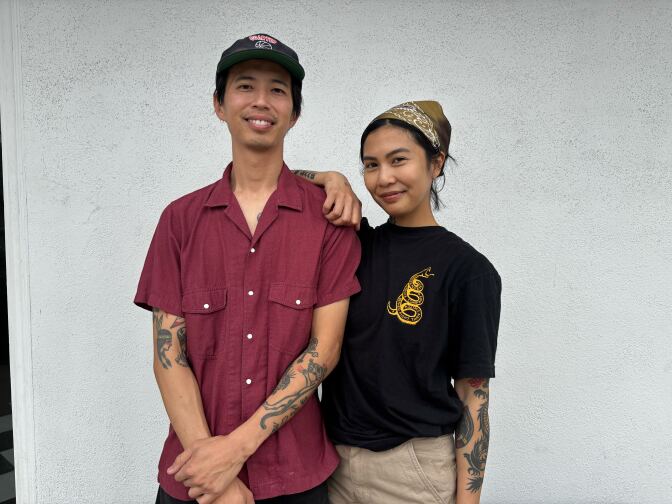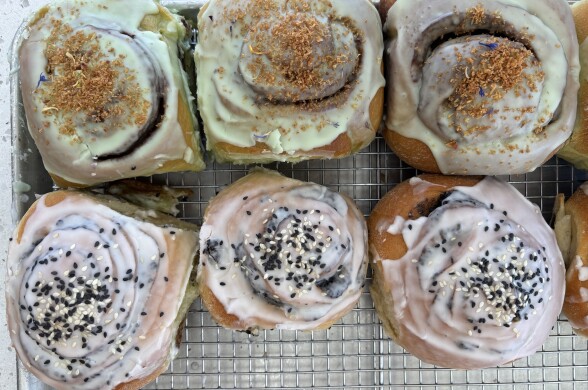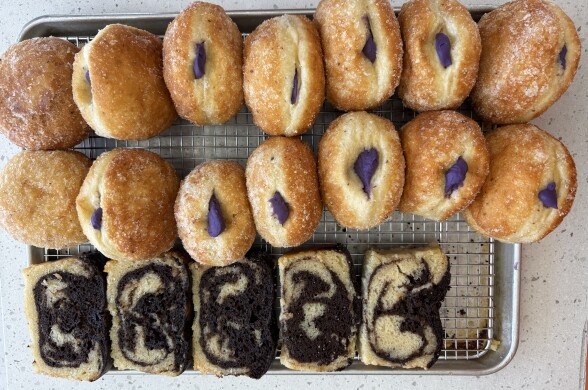This story is free to read because readers choose to support LAist. If you find value in independent local reporting, make a donation to power our newsroom today.
Two Filipino bakeries with a modern spin find their home in SoCal

For many in SoCal, Filipino baked goods like the pandesal, a sweet roll eaten at breakfast with coffee, is the taste of home.
SoCal has the second-largest population of Filipinos in the world, just behind Manila, with large enclaves in parts of the San Gabriel Valley and the South Bay.
Filipino-founded chain bakeries, rooted in cultural influences from China, Spain and other Southeast Asian countries, have served their local Pinoy communities for decades.
Stalwarts include Goldilocks Bakeshop, which established its first U.S. location in Artesia in 1976, and Red Ribbon Bakeshop, which opened in West Covina in 1984. Each has continued to expand to numerous locations throughout the region. Meanwhile, United Bread & Pastry in Silver Lake has remained a mom and pop neighborhood favorite for 40 years.
Adding a twist
Now, however, a new generation of bakers is taking those Filipino recipes and creating their own spin. Bakers like Kym Estrada and Arvin Torres, co-owners of San & Wolves Bakeshop in Long Beach. They specialize in traditional Filipino baked goods that are 100% vegan, nut-free and soy-free.

The couple started the business as a pop-up in 2017 while living in New York, but ultimately decided to move back home to Southern California. After hosting a series of pop-ups here, they saw the demand for their baked goods grow, and they opened their bakeshop in March earlier this year.
Despite being a vegan bakery, Estrada and Torres say they regularly sell their bread to the local community.
“ They don't care that it's vegan. They're just happy to support a Filipino business,” Torres said. “And they'll tell me, ‘Oh, I thought I'd come in because my daughter or husband told me about it,’ and then they'll leave with a handful of items.”

At San & Wolves, in addition to their pandesal, they also serve bibingkas, made with rice flour and blueberries, buko pop tarts filled with young coconut flesh topped with dark purple frosting, black sesame cinnamon rolls, and various other cookies and cakes.
The couple says their favorite pastry is pan de coco, similar to pandesal, a sweet roll filled with bukayo, a shredded coconut filling.
Torres recalls one night when Estrada was baking in their kitchen and she emerged with her latest version of pan de coco. He took a bite, and it instantly stopped him in his tracks.

“It tastes exactly like how I remembered it when I was a kid. So it has this personal tie for me. But also, it is my favorite because it's a traditional Filipino baked good. Every Filipino probably knows what a pan de coco is,” Torres said.
6100 is the place
In Santa Ana, chef Karlo Evaristo recently opened his brick-and-mortar bakery, 6100, after successfully using Instagram to sell his sourdough loaves out of his home. The name is inspired by the ZIP code of his hometown, Bacolod City, in the Philippines.
While 6100 sells a variety of European-inspired sourdough breads and pastries, his Filipino background can be seen throughout.

Take his milk bread recipe. It’s a soft, fluffy bread in Asia that’s usually made with yeast, but Evaristo's recipe uses sourdough, which he allows to ferment for three to four days. Biting into the cloud-like, squishy bread, you wouldn’t think it’s sourdough, but that’s just part of Evaristo’s magic.
In addition to his bread program, Evaristo offers Filipino-inspired baked goods like ube cruffins, which are a cross between a muffin and a croissant, topped with ube sweet cream. He also offers a ham and cheese croissant modeled after a croque monsieur sandwich, which is made with Persian ham and a mornay sauce made with gruyere.

And then there's his pandesal.
“I needed to put it on the menu so people would know I’m Filipino,” Evaristo said. “It doesn’t matter if you are rich or poor. If we talk about bread culture in the Philippines, pandesal should be the number one thing on that list.”
With no formal training as a baker, Evaristo built his career working in restaurants, including one his family owns in the Philippines and one in Singapore.
In 2018, he and his wife moved from the Philippines to Orange County. There, he began cooking at various restaurants and hotels in the area, eventually doing pasta pop-ups.
Hosting a pop-up at Melody, a wine bar in Virgil Village, Evaristo was mesmerized by the sourdough bread he tasted from Bub & Grandma's.
“It was just mind-blowing to me 'cause I never had good sourdough,” he said.
Hellbent on learning how to make it, he created his starter and then began serving his sourdough at his pop-ups.

When the pandemic happened, Evaristo pivoted to selling his bread out of his home; soon, crowds of people started showing up at his front door. So much so that he soon had to find his own space.
He chose Santa Ana because of the inexpensive rent, and found a Quonset hut identical to their next-door neighbors, Le Hut Dinette.
The bakery places an emphasis on hospitality and welcoming everyone. He sees that as a reflection of his Filipino background, too.
“That's part of our DNA as Filipinos, we like feeding people.," he said. "If you go to the Philippines and see somebody eating, they'll always ask you if you want some. That's just part of our culture. We can't be eating and not offer it to someone else."













